 MyDogBreeds
MyDogBreeds Schnauzer is originated from Germany but Abruzzenhund is originated from Italy. Schnauzer may grow 22 cm / 8 inches shorter than Abruzzenhund. Schnauzer may weigh 25 kg / 55 pounds lesser than Abruzzenhund. Schnauzer may live 3 years more than Abruzzenhund. Both Schnauzer and Abruzzenhund has almost same litter size. Both Schnauzer and Abruzzenhund requires Moderate maintenance.
Schnauzer is originated from Germany but Abruzzenhund is originated from Italy. Schnauzer may grow 22 cm / 8 inches shorter than Abruzzenhund. Schnauzer may weigh 25 kg / 55 pounds lesser than Abruzzenhund. Schnauzer may live 3 years more than Abruzzenhund. Both Schnauzer and Abruzzenhund has almost same litter size. Both Schnauzer and Abruzzenhund requires Moderate maintenance.
 These dogs hail from Germany and are particularly well known for their stern faces and their facial hair - the mustache and eyebrows. You get 3 types of Schnauzer – the Miniature, Standard and Giant.
These dogs hail from Germany and are particularly well known for their stern faces and their facial hair - the mustache and eyebrows. You get 3 types of Schnauzer – the Miniature, Standard and Giant.
These dogs have always been used for their rat catching skills. The Standard Schnauzer is also known as Mittelschnauzer and they have been categorized as working dogs but also as Terriers.
They've always been good herders of livestock and have been regarded as a good all-round farm dog. Most Standard Schnauzers have earned American Kennel Club (AKC) herding titles. They also make excellent watchdogs.
A breed standard for this dog was written in 1880. Also, the Bavarian Schnauzer Klub was formed in Munich in 1907.
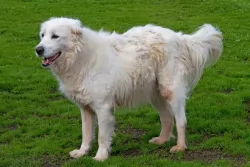 Abruzzenhund was established as an individual breed in the middle of the 20th century. They are descendant of the big, white Eastern sheepdogs which came to Europe 2000 years ago. Abruzzenhund is a mix of Turkish sheepdogs Akbash and Karabash, the Kuvac, Slovakian breed Hungarian breed, Komondor, and a French sheepdog Pyrenean Mountain Dog. Those dogs were much bigger than today’s breed. Abruzzenhund is still not very popular breed, but it is very common in Great Britain and Italy. They have been used as guard dogs, hunting dogs, and working dogs because they are very brave and strong.
Abruzzenhund was established as an individual breed in the middle of the 20th century. They are descendant of the big, white Eastern sheepdogs which came to Europe 2000 years ago. Abruzzenhund is a mix of Turkish sheepdogs Akbash and Karabash, the Kuvac, Slovakian breed Hungarian breed, Komondor, and a French sheepdog Pyrenean Mountain Dog. Those dogs were much bigger than today’s breed. Abruzzenhund is still not very popular breed, but it is very common in Great Britain and Italy. They have been used as guard dogs, hunting dogs, and working dogs because they are very brave and strong.
 You get the miniature and giant Schnauzer as well as the Standard. The Standard Schnauzer stands at between 43 to 51cm and weighs between 14 and 20kg. The dog comes in different color variants - black, black and silver and a greyish color.They have wiry coats that don’t shed much.
You get the miniature and giant Schnauzer as well as the Standard. The Standard Schnauzer stands at between 43 to 51cm and weighs between 14 and 20kg. The dog comes in different color variants - black, black and silver and a greyish color.They have wiry coats that don’t shed much.
They are squarely and robustly built and a typical feature is the mustache, beard and significant eyebrows of the dog. The ears are set high and were once clipped but they are left floppy these days.
The tail has always been traditionally cropped to around three vertebrae,giving the dog a distinctive look, but now it is often left as is and is medium length and curls over the dog’s back.
The Schnauzie is a seriously intelligent dog and this makes them highly trainable so that he can obey quite a few commands. These dogs get bored easily and will require exercise and games that will stimulate him mentally and physically.
They’re alert too, and will bark in warning at any intruders, making them excellent watchdogs. Other notable characteristics are courage and stamina and they have been used for search and rescue work.
These dogs have strong personalities, and are inclined to be stubborn so you want to be sure that they are trained and socialized. This makes them more amicable to be around – they’re obedient and know their place.
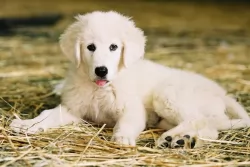 A height of Abruzzenhund variates between 60-73 cm, males are slightly bigger than females. While the weight is 30-45kg, again, males are heavier than females.
A height of Abruzzenhund variates between 60-73 cm, males are slightly bigger than females. While the weight is 30-45kg, again, males are heavier than females.
Abruzzenhund lifespan is between 11-13 years, but since these dogs don’t have any weaknesses and don’t tend to get sick, they can live longer with a proper care and adequate food and training.
Litter size of Abruzzenhund depends, but as any large breed, they usually have 6-9 puppies. And that is a very good considering size of the breed.
Abruzzenhund is not the only name of this breed. There are more names that you might hear. You can hear names like Maremma, Pastore, Abruzzese, Cane da Pastore, Maremmano- Abruzzese, Italian Sheepdog, and many similar names. Basically, they sound similar but there are differences.
Abruzzenhund is a friendly dog, but it is very powerful. Very strong jaw with a scissors bite makes them very strong. They have small but intelligent eyes, usually dark colored. The undercoat is dense, while the coat is white with segments of ivory to white yellow. Their long undercoat and coat make them winter resistant.
 Energetic, strong-willed and loyal, the Schnauzer can be an affectionate friend for children in the home as well as adults.
Energetic, strong-willed and loyal, the Schnauzer can be an affectionate friend for children in the home as well as adults.
He is cool towards strangers and he is also a bit snooty and aggressive with other dogs, but if he is brought up with them, he will show some loyalty and friendship towards them too.
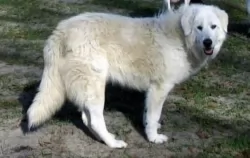 Abruzzenhund is a very well-balanced breed who loves spending time with other animals and people. They have a very good temper. They love being around families, and they are very gentle with children. It is important to train Abruzzenhund properly because the dog of that size should be a leader. A human with a strong character should train this breed. Training is important because they tend to make their own decisions which can be bad sometimes.
Abruzzenhund is a very well-balanced breed who loves spending time with other animals and people. They have a very good temper. They love being around families, and they are very gentle with children. It is important to train Abruzzenhund properly because the dog of that size should be a leader. A human with a strong character should train this breed. Training is important because they tend to make their own decisions which can be bad sometimes.
 Schnauzers are very healthy dogs. Nonetheless even these dogs can succumb to some of the many dog illnesses there are.
Schnauzers are very healthy dogs. Nonetheless even these dogs can succumb to some of the many dog illnesses there are.
Hip dysplasia is a common dog ailment and the Schnauzer isn’t immune to it. Hip dysplasia can be very sad in dogs as it can cripple a dog, with painful arthritis being his lot as well. It is no comfort for dog owners to know that hip dysplasia is common in most dog breeds – they are devastated when their once playful dog is brought down by hip dysplasia and exhibits signs of stiffness and pain.
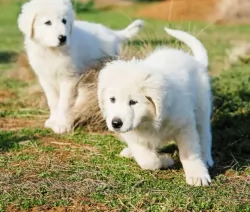 A great thing about Abruzzenhund is that they are very healthy dogs. They don’t have any chronical health problems, so if you are feeding your dog properly, with a lot of exercises they will not have any health problems. It is also important to check genetics of the dog.
A great thing about Abruzzenhund is that they are very healthy dogs. They don’t have any chronical health problems, so if you are feeding your dog properly, with a lot of exercises they will not have any health problems. It is also important to check genetics of the dog.
 Your Schnauzer will need to have his hair brushed twice a week as well as being professionally groomed. This is by hand-stripping or by clipping.
Your Schnauzer will need to have his hair brushed twice a week as well as being professionally groomed. This is by hand-stripping or by clipping.
Standard Schnauzers have lots of energy and will require adequate exercise every day – walks, ball games and runs off the leash.
Check his eyes and make sure there is no discharge. Check inside the ears and make sure there is no sign of redness and discharge. Look inside his mouth for rotting teeth. Bad teeth can cause lots of health problems with a dog, not just in terms of the teeth, but bad teeth can negatively affect other parts of the body too.
You want your Schnauzer to benefit from good food, after all nourishing food contributes to good health and longevity. If you choose to give your Schnauzer one of the commercially manufactured dog foods there are, make sure it is one of the better brands with more natural ingredients, The cheaper ones are filled with toxic ingredients.
Choose food according to his age, size and activity levels. To add some variety, feed him some home made food twice a week which can be added to his dry kibble. Boiled chicken, brown rice or pasta and spinach, sweet potatoes and carrots are a healthy choice for your pet. Try and include some raw meat into the diet. Ensure there is always a bowl of fresh, cool water for him.
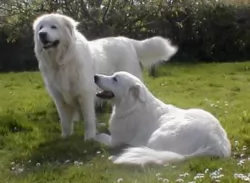 They learn very quickly, but it requires strong will and constant training to keep them happy. They are great working dogs, and with the positive training, they are amazing. It is very important that they follow rules and to keep them in balance with training.
They learn very quickly, but it requires strong will and constant training to keep them happy. They are great working dogs, and with the positive training, they are amazing. It is very important that they follow rules and to keep them in balance with training.
They can eat a lot of food, depend on their activity. High-Quality dog food twice a day for a grown dog is a must. While puppies should eat 3-5 times, smaller portions of food. The food is important especially for working dogs, they need up to 2000-3000Kcal per day. Abruzzenhund will enjoy eating meat with a lot of vegetables and oil.
They are not recommended for small house or apartment. They need big yard because they require a lot of space. During the winter they can be outside because of their coat, but during the summer they need to be in the shade with a lot of fresh water available anytime.
The coat should be brushed and groomed very often because they have a thick coat. There is a lot of dead and loose hair in it. During shedding, period takes even more time to groom your dog properly. They love and they need exercise. Mental exercise is important as physical. Every day walking, running, playing with other animals is an important part of dog's activity. When they get enough quality exercise, they will sleep in the house.